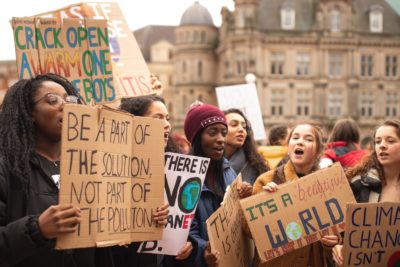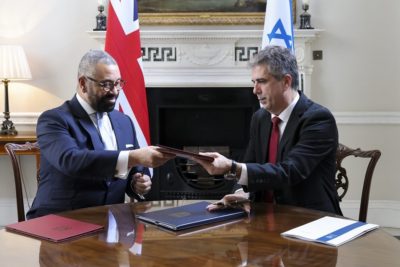Beyond Emissions: the military and climate change

‘We need a vast military-style campaign to marshal the strength of the global private sector. With trillions at its disposal’. Prince Charles evoked a wartime footing when making this statement to the press in November 2021.
As COP26 enters its final stages there will be many who echo these sentiments. Many others will contest the notion that private capital can produce an answer to climate change. And some would rightly point out what Charles, who will one day become symbolic head of Britain’s armed forces, must know: militaries run on oil. The carbon emissions that their fleets of tanks, ships and aircraft produce – and those created during production of these vast arsenals – are a key topic in the debate about our threatened climate and a talking point in Glasgow after the launch of the military emissions campaign.
Understanding how the military, and defence and security interests, have contributed to environmental degradation and soaring emissions is a vital part of addressing the increasing urgency of the climate crisis. Scientists for Global Responsibility (SGR) estimate that the US military produces 339 million tonnes of CO2e (carbon dioxide equivalent), 3% of its national emissions, while closer to home the UK military accounts for 13 million tonnes of CO2e, 6% of the nation’s total. By slightly different metrics, defence accounts for 50% of the UK central government’s emissions.
SGR suggests that 5% of global emissions are military in origin and that this may increase by an additional 1% during wartime. But while this strand of the debate has had considerable airtime in popular media (even trendy magazine GQ did a piece on it) much less is said on the many other ways that militaries, militarism and climate change intersect.
More than military consumerism
As the voices calling for more radical and systemic change than what’s on offer at COP26 grow, we need to look beyond a kind of green consumerism for defence and security – a jarring and contradictory concept in the context of warfare.
Developing the critique further will help civil society demand change in traditional national security led approaches, helping us understand how states and other vested interests are likely to create militarised and securitised responses to the climate emergency. In the UK, Rethinking Security is doing valuable work on conceptualising a security based on cooperation and human need; moving definitions away from current notions based on conflict and violence.
However, the government’s recent Integrated Defence and Security Review gives a strong indication that, despite some discussion of the challenges posed by climate change, the nation state and national interest will continue to be prioritised. The new competitive age – powered by defence and security industries – envisioned by the review falls far short of facilitating the kind of cooperative approaches we need in the face of climate emergency.
Looking at policing of domestic populations under climate crisis pressure provides salient examples of how responses can quickly resort to violence. The state’s reaction to the rise of grassroots movements calling for a radical green new deal, and social justice movements like XR and BLM who demand systemic change, is increasingly authoritarian, and part of a long history of repressive policing of protest that is also evident at COP26. In the UK, climate activists have been classed as extremist, with new legislation to increase police powers coming in direct response to the sustained actions needed to force the issue to the top of the agenda. Despite the generally accepted climate emergency, more recent currents within the movement – like Insulate Britain – have been demonised and mocked in the conservative press, and the emergent youth leadership has been patronised by an old guard clinging to a moral authority they no longer have.
Looking at policing of domestic populations under climate crisis pressure provides salient examples of how responses can quickly resort to violence.
The US response to the devastation of New Orleans by Hurricane Katrina provides a more extreme example. Local and national security forces, including private security companies, treated civilians as insurgents and the city as a war zone as ‘government’s aid efforts were in chaos’.
Climate security or securitising the response?
Understanding what security in the face of environmental crisis looks like will be different depending on where, and who, one is on the planet. What interests do those defining security represent? Nick Buxton, at the Transnational Institute (TNI), points to high-level discussions in Australia in which military generals were heavily involved. He warns that:
‘[F]raming climate change as a security matter…has significant consequences in shaping how we respond to a warming planet. As the climate crisis unfolds, is the military the institution we want to turn to for solutions?’
Buxton points out that the Australian Department of Defence strategy has “dystopian” potential and rests on assumptions that climate change will reduce societies to a Hobbesian, dog-eat-dog state of nature. The effect of this approach will be, ‘to turn the victims of climate change into potential threats and to make a militarised response to the impact of climate change the default response’.
In their newly published Primer on Climate Security, TNI also state that:
‘The fundamental problem with making climate change a security issue is that it responds to a crisis caused by systemic injustice with ‘security’ solutions, hardwired in an ideology and institutions designed to seek control and continuity. At a time when limiting climate change and ensuring a just transition requires a radical redistribution of power and wealth, a security approach seeks to perpetuate the status quo.’
This excellent document explores six main impacts of the securitisation of the climate crisis (see box) – and a number of assumptions that are made in the process relating to scarcity, conflict and migration – and questions whether the military are best placed to deliver humanitarian responses. As well as underplaying the central role of oil and extraction in the causes of war and military operations, the corporate defence and security sector is set to benefit from increased state budgets for defence, border, policing and surveillance equipment, including huge contracts to develop new technologies.
Allowing the debate to be dominated by a defence and security sector which is ‘expecting and preparing for the worst’, while marginalised groups are excluded, further entrenches the top-down securitised policy framework; it racialises and labels those from elsewhere as a threat, centres the problem away from communities across the globe already most impacted, and ignores the people-powered and cooperative grassroots response to the climate crisis that provides our best hope.
| Six main impacts of responding to climate change as a security issue
Primer on Climate Security, Transnational Institute, 2021 1. Obscures or diverts attention from the causes of climate change, blocking necessary change to the unjust status quo. 2. Strengthens a booming military and security apparatus and industry that has already gained unprecedented wealth and power in the wake of 9/11. 3. Shifts responsibility for the climate crisis to the victims of climate change, casting them as ‘risks’ or ‘threats’. 4. Reinforces corporate interests. 5. Creates insecurity. 6. Undermines other ways of dealing with climate impacts. |
The UK military response
What, then, of the British military’s response to climate change and its plans to deal with the outcomes?
On an institutional level, the UK military has long accepted that anthropogenic climate change is real, pressing and well underway. Though the military may be a conservative organisation, it takes a fairly practical position on what this all means. Climate change and its outcomes have been a key part of the Ministry of Defence’s Global Strategic Trends (GST) reports. The 2018 publication opens by stating that ‘human influence on the climate system will have far-reaching consequences’, before outlining at length the dangerous and radical forms these changes are likely to take. A 2014 piece by Carbon Brief analysing that year’s GST report argues that, perhaps more than any other body, the military takes the idea of “mainstreaming” climate change to heart and is leading the way among government departments in terms of “long-range analysis”. Yet it’s not that simple.
Opportunities and optics
Despite the military engagement with climate change, prior to this year there was little beyond some fairly standard corporate social responsibility (CSR) pledges around recycling, cutting vehicle emissions and so on. As comments from one general suggested, these appear to be as much about recruiting green-minded millennials as about an urge to save the planet. This points to a powerful motivation for the UK military to be seen to provide leadership on the issue which is separate from the government response. That is, how militaries respond to climate change will be fundamental to their future role and the survival of the armed forces as powerful institutions. We have observed that this tendency towards opportunism – turning a situation towards its own advantage – is a common trait of military institutions. It fits a pattern of behaviour that is key to understanding the shift in UK civil-military relations over the last 15 years as the armed forces seek to strengthen their relevance to society.
Take the example of disaster response. In March 2021 the MoD released its Climate Change and Stability Strategic Approach, outlining how Defence aims to respond to the effects of global heating and meet the UK’s emission reduction targets. Championing its speed and effectiveness of action, the MoD sees an increased role for Defence in disaster response and support for civilian authorities. There are parallels here with the 2008 report on the National Recognition of Our Armed Forces, a totally different document concerned with improving the image and visibility of Britain’s military. Under the heading “Military Aid to the Community”, the report states:
‘Military aid to the civil authorities and to the civil community is an immensely appreciated and highly visible role of the Armed Forces. We think it desirable not only that those involved wear uniform – generally combats in this context – but also that some publicity is given to the Services and to the units concerned (it is otherwise difficult or impossible for the media or the public to know which of the Services, and which unit, is involved)’.
Providing leadership
The 2021 document ramps up the number of proposals under the themes of “adaptation and resilience”, “sustainability and net zero” and “global leadership”, outlining six or seven main responses under each. It describes an “epoch by epoch approach” up to 2050 and gives further detail for the “setting the foundations” epoch from now until 2025.
The report boldly asserts that, ‘Defence can and will take a lead in response to the emerging geopolitical and conflict-related threats’ (our emphasis) and that, ‘Defence must be fully involved in shaping and implementing wider government policy.’ It’s a firm position that the UK armed forces want to have, and should be seen to be playing, a leading role in the development and implementation of the UK and global climate change response.
Prioritising military operations
In other documents, the focus is on battlefield capabilities. The MoD’s Climate Change and Security Report leads its ‘strategic ambition 2050’ by stating that Defence will have ‘adapted to be able to fight and win in ever more hostile and unforgiving physical environments’. Military definitions of sustainability centre on the capacity to continue military operations with decreasing fossil fuels dependency, and more self-sufficiency, in a net zero and wildlife friendly context. The massive environmental degradation that is part and parcel of war is not mentioned. Neither are the many harmful effects of military action, from breakdown of communities and loss of livelihoods and support systems, to migration and the fuelling of wide scale and long-term tensions. Not to mention the carbon emissions that come from rebuilding cities decimated by airstrikes and artillery.
MoD reports predict flooding, warming, rising sea levels, extreme weather, crop failure, population displacement, mass migrations, state competition and foreground the civil unrest and security implications of these events. Yet the military seems assured that its own leadership and ability to adapt and show resilience, meeting its net zero commitments, ‘should guide our way to peace, prosperity and operational effectiveness’.
It is fairly clear that, despite the pressing nature of the issue, the UK military is still focused on dealing with symptoms rather than causes in its policy and operations. This is perfectly predictable. The military is a highly political institution and it would take a serious democratic political program to realign it, and its considerable resources, towards looking at ways to mitigate climate change that do not prioritise its own operational advantage, and institutional interests.
The danger is that the climate crisis becomes a security crisis that relies on military-led solutions. We know where that could lead. The onus remains on all of us to push both state and non-state actors onto a course which can provide a democratic and fair, cleaner and safer, future for our planet. We need climate justice not climate security.
More information on the Alternative Security Review to be launched on the 18 November 2021 by Rethinking Security can be found here.
See more: human rights, legislation & policy, military in society, security, climate change, militarisation
Like what you read?
> Sign up for our newsletter or blog notifications
> Support our work – from just £2 a month










